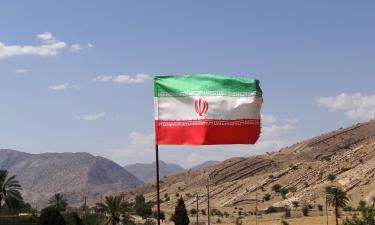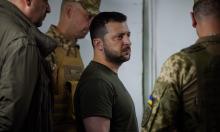Support to US's Aggression May Have Negative Effect to Latvia
Baltic countries, as well as majority of the former Soviet republics expressed their support to the anti-Iraq coalition on an official level. It is quite natural that the war in Iraq is the key topic in the Latvian mass media now. At the same time, there are just few reports about the war made by journalists of the Baltic newspapers; there are no reports on views of Latvia upon the Mideast situation and no solutions are suggested for settlement of the war. The newspapers mostly reprint information published by Russian and foreign news agencies. In fact, this is more than enough for Latvia, one of Washington's most devoted satellites. To tell the truth, there are exceptions from the rule in Latvia as well. There are some newspapers in Latvia which publications deserve close attention, they openly publish a subjective point of view of the authors that sometimes is contrary to the official opinion and the version spread by CNN. We wold like to pay attention to a recent publication in the Latvian press.
The Latvian newspaper NEATKARIGA RITA AVIZE published an article under the title "Authorities at war, but is the country ready for it?" on March 31.
The newspaper wrote, Latvia started "democracy establishment" in Iraq. "It's a pity everything is going on as though for pretence. George W. Bush thinks that it is not America alone but "the coalition of the states on the whole" that is carrying rescue to Iraq. But the Latvian authorities demonstrated their impotence when they reached a political decision to participate in the war. They say, no martial law has been declared in Latvia. How is it possible? Latvia calls George W. Bush to express its support in the war, the US president is happy to inform the whole of the world that Latvia's support will help to gain victory. But those officials in Latvia who made the decision to support the US-led aggression are trying to persuade the people of the country that nothing at all occurred in fact, and if anything is to happen, it will be in a month.
The minister of defense, a poor guy, is thinking day and night about Latvia's future; the minister of foreign affairs emphasizes that Hussein's threats are more close to Latvia than people can even imagine. But these are rather virtual apprehensions. In fact, the population was demonstrated only archaic gas masks and nothing more that people should know in any variants of casus belli. Is the decision reached by the Latvian Seym just a diplomatic speculation? Can Latvian high-ranking authorities guarantee that the political decision won't entail any military or aggressive consequences on the Latvian territory, no matter how actively the situation with weapons and the war develops?
Nevertheless, any state that speaks in support of a war must estimate the real risk level and be ready for a war on its own territory. What is this risk in fact? What should a state that takes the risk into consideration do in this situation? When any government run by professionals takes a decision connected with war, it enters a definite degree of readiness that is testified with an adequate level of information distribution in the society. Sirens, old gas masks and fire extinguishers reveal Latvia's level of thinking that is close to that one of an army sergeant.
We mean that after taking this serious decision, officials still feed the society with information that is absolutely inessential. They still popularize the decision in the light of global threats, but at the same time they behave as if the decision will concern just 150 possible volunteers. Our opinion is that methods of this kind are the main reason why much protests against the war are being currently organized. Is there someone in Europe who goes out in the street because of the Hussein syndrome? No matter how mass the demonstration in Europe are, there is no syndrome of this kind there. The pathos of the demonstrations is directed against manipulation with people and states, against concealing of local interests under the values common to all mankind. People are protesting against substitution of an ineffective mechanism of making international decisions (the UNO) with obvious neglect of the international law. People don't want, as a Kurdish emigrant once said, "Saddam Bush to come and replace Saddam Hussein".
What is more, the very first days of the US-led aggression demonstrated that there would be no blitzkrieg, that it might be a big problem to separate Hussein's regime, no matter what it is, from the nation. The longer the war continues and the more information is reported about resistance of the Iraqis (not only the army but also the people's volunteer corps), the more obviously the war turns into a war not against the regime, but against Iraq as a sovereign state. The "guaranteeing of peace" is now looking more and more like occupation. Americans are right when they assume that "if the war isn't fast and effective, it will exert more radical influence upon the society."
In this connection, Latvian authorities should make an effort to give the society an actual idea of possible development of the situation. They should at least know how to answer very simple questions in this connection.
When the Latvian people hear the phrase "collective security", does it mean that Latvia prefers authoritarian understanding of security, authoritarian leadership and authoritarian method for definitionof instability sources rather than collective nature of security maintaining? Does Latvia think that some states can use economic and political expansion to substitute the United Nations Organization and other systems of international regulation? If the UN fails to prevent local wars (Vietnam, Angola, Somalia, Ethiopia, Iraq), does it mean that wars can be waged when it just comes to one's mind? Does it mean reforming of the existing model of international relations, or is it a new kind of relationship when there will be no center of negotiations in the world, but instead, a tendency will arise to group around one or several sources of might? To what extent is a precedent important in this situation?
If we use US's motivation, then it turns out that Turkey had a reason to introduce the troops in Iraq as it's scared with the intention of Kurds to get separated. Why didn't Israel do away with Palestine, China with Taiwan without waiting for sanctions of the governments? Does Latvia seriously support the idea of encroachment upon sovereignty of states, and what does a state mean if sovereignty isn't absolute even on the constitutional level? Why is it so that some countries have a right to have any weapons of mass destruction, and others don't? After all, if we speak about a broad or global anti-terrorist coalition, there is probably someone who might profit from a split in the coalition from unilateral actions of some of the members."
Sergey Stefanov PRAVDA.Ru
Translated by Maria Gousseva
Read the original in Russian: https://www.pravda.ru/world/32919-latviasmi/
Related links:
Subscribe to Pravda.Ru Telegram channel, Facebook, RSS!





